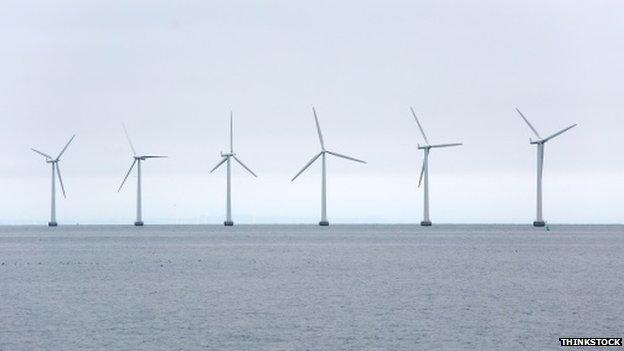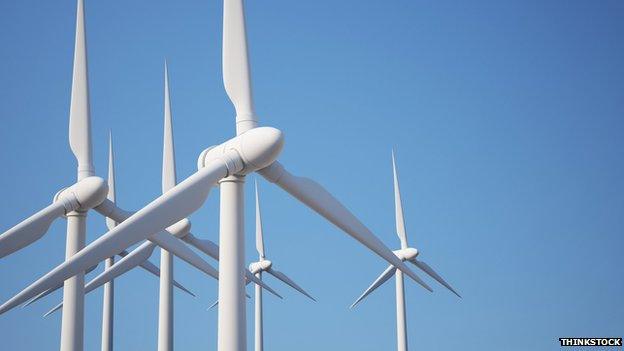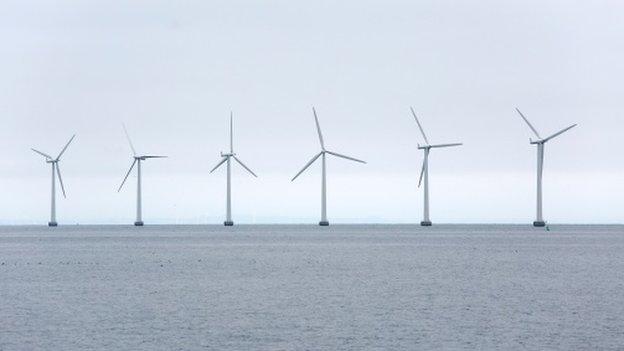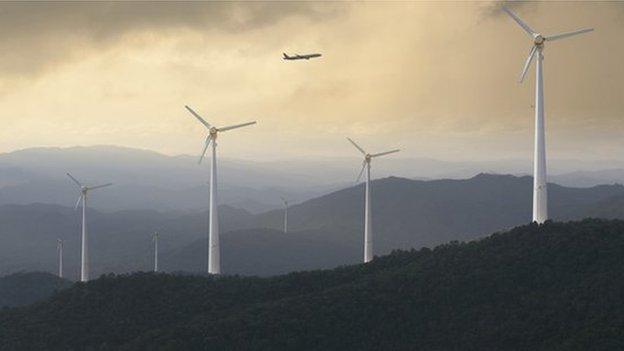RSPB Scotland challenges windfarms
- Published

The four proposed offshore developments could include more than 400 turbines
A Scottish wildlife charity has lodged a legal challenge against the consent granted to four major offshore wind farm projects.
RSPB Scotland is challenging the developments in the Firth of Forth and Firth of Tay.
Scottish ministers approved the Inch Cape, Neart na Gaoithe and Seagreen Alpha and Bravo projects in October.
Industry body Scottish Renewables described the legal challenge as "really disappointing".
The four projects could comprise more than 400 turbines and generate more than 2.2GW of power, enough to power more than 1.4million homes every year.
Consent was given to the four developments under strict conditions to mitigate any potential environmental impact, and backing was given by environmental groups including Friends of the Earth Scotland.
However, a spokesman for RSPB Scotland said the approved projects could have "serious implications" for wildlife in the area.
'Taking a stand'
He said: "We have not taken this decision lightly, but having given serious consideration to these decisions to grant consent, we have decided to take legal action.
"RSPB Scotland has a proven track record of taking a stand for nature, on behalf of our members and the general public, to ensure that wildlife and the natural environment is properly safeguarded for the future.
"If these decisions are allowed to stand, they could have serious implications for how birds and important wildlife sites are protected across Scotland and beyond.
"The vast majority of renewable energy developments pose no significant threat to birds or other wildlife.
"RSPB Scotland continues to support the development of carefully sited and designed renewables, including offshore wind. However, individual developments must be sited to avoid significant harm."

RSPB Scotland fears the turbines could have "serious implications" for wildlife
Lindsay Leask, senior policy manager at Scottish Renewables, said the challenge by RSPB Scotland was "really disappointing news".
She said: "Every one of these projects has been through an incredibly rigorous, detailed and independent assessment lasting anywhere between one and two years, and it now looks like there will be another lengthy examination of that process in court before they can go ahead.
"This new delay will make it even harder for Scotland to catch up with the rest of UK and northern Europe, which already have a sizeable offshore wind industry and supply chain supporting thousands of jobs.
"The irony here is that climate change is reckoned to be one of the biggest threats to Scotland's protected habitats and species. Offshore wind is a key part of the mix required for us to meet our targets for the growth of renewables and the reduction of carbon emissions."
The Neart na Gaoith wind farm east of the Fife Ness coastline would include up to 75 turbines, generating 450MW of power.
The Alpha and Bravo Seagreen developments combined would consist of up to 150 turbines, around 16-23 miles (27-38km), off the Angus coastline, and could generate 1,050MW.
And the Inch Cape development, also off the Angus coastline, would total no more than 110 turbines, generating 784MW.
- Published10 October 2014

- Published2 October 2014

- Published4 July 2013
